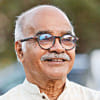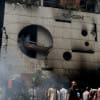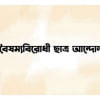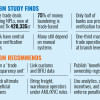$12-15b laundered every year during the AL rule

Between $12 billion and $15 billion was siphoned out of the country every year over the last 15 years, said Iftekharuzzaman, executive director of Transparency International Bangladesh.
Iftekharuzzaman also gave a partial breakdown of the laundered money in a year. For instance, of the $15 billion laundered, $3 billion was sent abroad by trade mis-invoicing and foreign citizens working in the country.
Moreover, $2.2 billion was laundered by unscrupulous manpower brokers who sent money abroad to get visas and work permits for seekers of overseas jobs.
Apart from the two, $7.5 billion was laundered every year through mobile financial services, he said at a seminar held at the office of the Economic Reporters' Forum (ERF) in Dhaka yesterday on laundered money and how to recover the money.
Regarding the recent remark by Bangladesh Bank Governor Ahsan H Mansur that tycoons linked to the former administration of Sheikh Hasina siphoned off $17 billion from the banking sector during her rule, he said the total amount laundered would be much more as $17 billion was taken out with direct help of the central bank.
The other means of laundering were not mentioned, said Iftekharuzzaman, who also heads the Anti-Corruption Reform Commission formed by the interim government last month.
Hundi was also used for money laundering and expatriate Bangladeshis laundered money for buying assets abroad too. People travelling abroad for health services laundered money.
The BB, the Anti-Corruption Commission, and the Office of the Attorney General were used to facilitate money laundering.
He also criticised some countries that are attracting laundered money by introducing golden visas and second-home options.
In Bangladesh, if any foreign citizen wants to buy a luxurious home in Dhaka's Gulshan, they won't be able to make the purchase.
But in many countries, the governments will not ask questions if a Bangladeshi wants to buy a luxurious apartment there.
"This is how a former Bangladeshi minister bought more than 300 properties abroad and it is the tip of the iceberg. There are many such cases. It proves that there is a demand side apart from the supply side ... . Many countries have created opportunities for money launderers."
While it is possible to retrieve the laundered money, it is extremely difficult and nearly impossible, Iftekharuzzaman said.
Until Bangladesh makes a law and signs agreements with other countries for returning the money, it is not possible to bring back the laundered money.
"France willingly returned the laundered money to some former French colonies in Africa as it thought French-speaking people would face financial troubles. All countries will not be proactive like France in returning the money."
Only Singapore returned $9.3 million to Bangladesh in the Siemens case between 2007 and 2013 as the Singaporean government was cooperative.
A coordinated approach is needed among state agencies like the ACC, the Criminal Investigation Department, the National Board of Revenue, the attorney general and the Bangladesh Financial Intelligence Unit (BFIU) to retrieve the laundered money.
The government has started negotiations with some countries like the US, the UK and the EU to bring back the stolen money.
"But it will be a surprise if the interim government can bring back even $100 million during its tenure. Even a single penny returned will be a surprise."
Bangladesh will have to start work to stop the laundering by ushering in reforms in the institutions.
"It is expected that the next elected government will also follow the changed rules to discourage money laundering."
The ACC did not take action against the high-ups of the immediate past government but after August 5 the same people are taking action against more than 200 powerful people, Iftekharuzzaman added.
Mostafa Kamal Majumder, editor of GreenWatch Dhaka, moderated the seminar jointly organised by the ERF and Sombhabonar Bangladesh.
Jasim Uddin Ahmad, former vice-chancellor of Jahangirnagar University, ERF President Mohammad Refayet Ullah Mirdha and ERF General Secretary Abul Kashem also spoke.

 For all latest news, follow The Daily Star's Google News channel.
For all latest news, follow The Daily Star's Google News channel. 








Comments